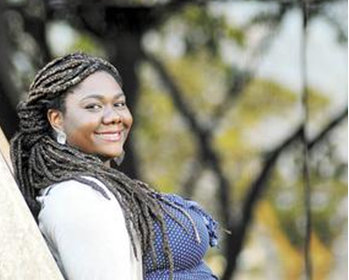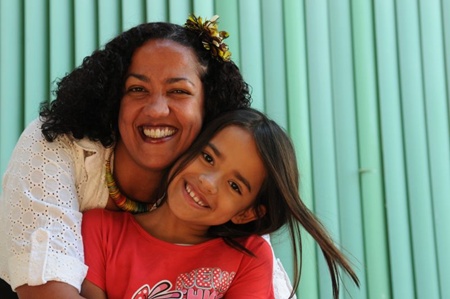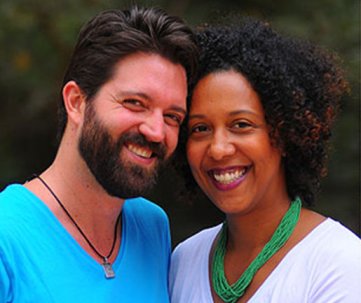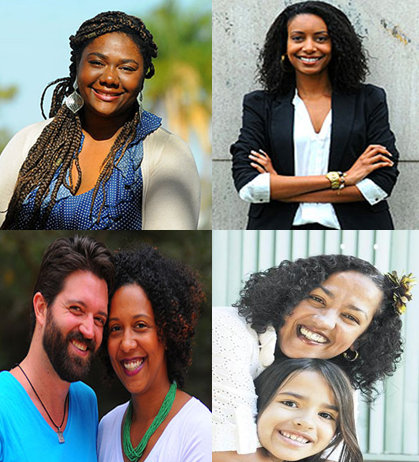
September 16, 2013
Black women have difficulty
finding mates, maintaining
long-term relationships and
getting married
Note from BW of Brazil: Today’s post features a story produced by the Correio Braziliense newspaper based in Brazil’s capital city. The story approaches a situation that was front page headlines in the US a few years ago: successful black women and the difficulty of finding a serious relationship or marriage. In past posts in this blog that discussed the question of interracial relationships and the promotion of white women as the standard of beauty in Brazil, the position of black women in the marriage/relationship area was also touched upon. Some of the very same comments and theories mentioned on those posts were confirmed in the comments of the four women interviewed in this article. Although some may believe that the situation being blown out of proportion, statistics don’t lie, a point that will be covered in a future post. For now, check out the experiences of these four black women.
Four beautiful women and successful women confirm the thesis that some studies have addressed: black women have more difficulty engaging in serious romances
By Flávia Duarte of Correio Braziliense newspaper magazine
The subject is so delicate that few have the courage to touch upon it. Speaking of contempt, feeling passed over and loneliness opens wounds, throws prejudice in the face of black women throughout their history. Furthermore, all of the discrimination that makes them one of the most vulnerable personalities in society – they are the ones who earn less, have less education and hold less noble positions in the labor market – the color of the skin requires them to walk a long and painful path in search of love. It’s even more tortuous when the desired destination is the altar. “Black women marry later, have higher rates of celibacy and take longer to have a relationship,” says sociologist Bruna Pereira, a research collaborator at the Núcleo de Estudos e Pesquisa sobre a Mulher (Nepem or the Center for Studies and Research on Women), at the University of Brasília.
The statistics in Brazil which confirm the result of abandonment as a consequence of race are rare, but the discussion is old. Professor in the Department of Social Sciences at the State University of Londrina and doctoral student at PUC/SP, Maria Nilza da Silva says that in the 1950s, some theorists trying to understand the phenomenon of devaluation of black women, rarely seen as an option for being a wife and partner. “Even then, to be chosen in this context of conjugabilidade, the black woman ends up relating to a man of lower social class. To be chosen, she must have some advantage.”
Motivated by the theme, Maria Nilza also researched the lower supply of available partners. That was in the 1990s, but the professor argues that little has changed since then. “A black woman continues being discriminated against in various segments, including marriage. The possibility of finding a mate or partner is less for her,” she says.
Intrigued by the fact that black women are lonelier than white women, the pedagogue with a master’s in social sciences, Claudete Alves decided for over a year and a half to look into 1,127 couples in São Paulo. Of these, only 418 were formed by black men and black women. One reason for so few couples of the same race lies in the fact that black men who ascend socially want to relate themselves with white women. They seek in union with another race a way to re-enforce their position of supposed status. “The black man wants to have what the white man has and this includes the white woman. Many want children with lighter skin than theirs so that they don’t suffer the prejudice they also suffered,” says Claudette.

The rejection is also on the part of white men. In Brazil, the black woman is a minority in cultural spaces reserved for those with fair skin. This would automatically leave them at a disadvantage compared to white women.
Of the 18 civil marriages that Claudete witnessed throughout the research, only three pairs brought together black couples. One difficulty of finding a mate of the same color was confirmed by all 11 black women that the researcher interviewed at the time. Among the reports, many said that, when they were young, they were sought by black men only for sexual initiation. When they got pregnant, they hardly acknowledged the child. It was a relationship with an announced end. Confirmation of the stereotype of the sexual black woman, which still today carries in many cases, a heavy legacy of slavery, when they were chosen to satisfy the desire of white men. For the romance to work out, they demanded an exchange. “They also said that when they managed to remain with black men, they had to support them. In general, they were of lower education and maintained different social practice from them.”
It is a postponement that is observed in all social classes. The ones who confirmed this were beautiful, successful, middle class women who grew up in the Plano Piloto (1). Daniela Luciana, Jaqueline, Denise and Marilia are black women. They also feel the historic weight that color carries. They confirm the prejudice and the difficulty of finding themselves on equal footing with white women. One problem is not theirs. It comes from the other. “These women need to understand that this difficulty is the result of a social problem and not personal. They inferiorize themselves as if they were not pretty or interesting,” laments Paula Pereira, a researcher- collaborator of NEPEM. Daniela Luciana, Jaqueline, Denise and Marilia recognize the difficulty of overcoming the shackles of racism is not theirs, but even so they face the looks of prejudices with tranquility.
“Many black women feel that in their lives there is little or no love. This is one of our private truths that is rarely discussed in public. This reality is so painful that black women rarely speak openly about it.” – Bell Hooks is a black female activist and feminist in the United States
A couple of the same race

Janaína Bittencourt is 24 years old. She was raised in the Plano Piloto area. She and her brother were the only blacks in the private school where he studied. Her last relationship lasted more than two years with a man of the same color. Single, made a decision: she wants a black husband.
“It took a long time for me to see myself as a potentially beautiful person. At school, I don’t remember having suffered that hard racism. I began to see it around 13 or 14, when we get interested in boys. Everyone had a partner, except me. I attributed this to the fact of not being beautiful. I identified that I had a different aesthetic from that in that school was important, like straight hair, for example. Anyway, those things that later, as adults, we learn how to reveal. My role, at that time, was that of the friend who makes the bridge for others to get in the party.
“Older men noticed me more. I believe that I always woke up their sexual appetite. The approach was always very direct with me, they didn’t have care that they had with the white girls. That’s what gets your self-esteem. If I stay with someone, I never had a chance to turn one thing into something more.
“The family of a white man always has a higher resistance. It was always a tense moment. I stayed in doubt in saying: ‘Tell your parents I’m black.’ The first guy I fell in love with at the age of 18 was very quiet on the issue of race. When I went to meet his family, however, his mother was a bit shocked, she couldn’t hide it. I thought it was all in my head. But after that, it was over. Two months later, he was dating a white girl.
“What many people don’t see is that the dismissal of black women is something that society teaches us. The black woman is supposedly good for sex and for superficial relationships, but not for marriage. In this game, women are even relegated by black men. It’s a little death that you will not be feasible for anyone, even for those who should be your natural partner.
“I had relationships with white men, but the cost was very heavy. I didn’t have the freedom to go out with my braids, if they didn’t have the right maintenance at the roots. The society is not prepared for the black aesthetic. The black man, perhaps by having a black mother at home, understands that cabelo crespo (curly/kiny hair) gets messed up when you sleep. With the white man it’s always a process. I had to wake up early, put some water on my hair so that it more or less maintains. Dating a white man is to have to go through these issues that I don’t know if I want to. It took long for me see myself as a beautiful person, capable of a relationship, and now I don’t have to go through all that again.
“Marriage also implies having children, and black children. And for some people, this is a terror; maybe not even associating it to the color of the skin but to the cabelo duro (hard or nappy hair). Because of this, many black women begin to soften their features to get to an aesthetic seen as more beautiful. I want my children to be black, that bring in the skin the symbolism that my family has. I’m criticized when I say that. An aunt said that we had to have this concern with softening our features. I think this is a (form of) violence.
“White women, as a rule, marry more, consolidate family, and stay married longer. Previously, for the white woman, the desired future was being a wife and housewife. Black women have already had to work to support themselves. For black women, who for a long time and could not even marry, the family happened without the presence of a man. So, I understand that there is this fixation with being married on paper. It is the assertion of an affection which was always denied to us.”
A militant of affection

The Bahian public servant Daniela Luciana Silva is 42 years old. A black woman, she is in an intrarracial marriage and has already been mistaken for the nany of her daughter, Maria, 7. She says that black women follow a long way in the quest for self-esteem.
“I was born contrary to the statistics; I was born in the middle class. I am a resident of the Plano Piloto where there are few blacks. Men don’t approach black women with the same frequency that they approach white women. The color is a mark of poverty, someone less marriageable. I studied in a private school in Bahia, where I was the only black. At age 15, I had several crushes, but the boys never called me to dance, for example. My first boyfriend was black. I call it dating out of poetic license. There were a few kisses during the holidays. It took me a long time to date again.
“The mothers of black women educate us to understand that when you leave the house, you could be crippled by racism. They said the men would not value us. Therefore, the black woman is also more suspicious. You become less daring, less spontaneous. And sometimes, you end up being arrogant in order to compensate the origins (of the interest).
“Until then, at 18, I went to college in Salvador. There, I was not the minority. To the contrary, I was the model of what was beautiful. When I came to Brasilia, didn’t think I was going to get married, that I didn’t have a chance. But I got married at 34. He was white and 23. He never allowed that they would point out these racial marks between us. Sometimes I noticed that people were looking at us as if to say: ‘How is this woman with this guy?’ Imagine! I was older and black. We separated since 2010, but we got married in love, for love.
“For black women, it is very difficult to have relationships. What I perceive as a militant and a woman, is that everyone wants approval. The black man also. And he makes choices. In some cases, he chooses a white woman, because they also want acceptance in front of the group in which he is a minority, as what happens in Plano Piloto. Those who ascend socially end up frequenting places where the majority are white people, then they can make their relationship choices more easily than the black woman.
“However, if you define that a black man can only relate with a black woman and a white man with only white, it gets very difficult to find partners. There are men who will never be with a black woman, because she is not part of their taste. He does not want anyone that carries the component of genetic inheritance and poor family. He wants something easy, without the complexity that is dealing with the historic question of race, of prejudice. The problem is not ours. It’s just that we have more negative elements in this game. We are not the standard choice of any less courageous man, less assured of himself.
“I don’t have this restriction, but there are girls who want to relate only to black men because they decided to make a political position also in the relationship field. I don’t think it’s wrong. I want to marry again. I know what I want and what I need. What differentiates us from white women is that we have to work much more to get everything and security in a relationship. I am a militant affection. Society is what leads us to accept few things, but I know what I deserve and I don’t accept it.”
Love between races

Anthropologist Denise Costa, 29, never thought of having a relationship with a white man. Until bumping into the one who would be her husband. Married for three years, she doesn’t deny that she was afraid of being presented to his family and, every now and then, together they face some situations of prejudice.
“Before my husband I only had black boyfriends. I didn’t think I would date a white man for fear of him not accepting me. So much so that, as soon as I started dating Daniel, my greatest fear was his family rejecting me in some way. It didn’t happen. We, black women, we know that we can not always be accepted in the environments we attend and that this also happens in relationships.
“My first boyfriend, at age 15, was black. Not many (guys) approached me at that time. I looked at my white friends and I thought, ‘I think I’m prettier than them, but the boys are looking more at them.’ Today I have a higher self-esteem.
“Unconsciously, I avoided relationships with white men. I circulated in spaces where the presence of blacks was greater. I think it was really a protection, of finding that it was not my place. But I was single and wanted to meet interesting people. That’s when I started dating Daniel, unpretentiously. We met in college. For him, it was a new experience as well. He had never dated a black woman.
“The race issue was eventually imposed on his life. Because I wear my hair natural, it has already happened that people in the street yelled at me to cut it. My husband gets angry. He also had another episode that took place in a luxury condominium that his sister lives in in Minas Gerais. At the time of identification, the doorman said, ‘Your brother is here with a morenona (2)’, in a very aggressive way. Why didn’t he think I was his wife and respect that? There is a very subtle racism in Brazil, which is so subjective that you can’t unmask and give a name to what is happening. And there is this blatant racism. Daniel gets nervous in these situations, swears, but I say: ‘Do get mixed up in this, no.’
“I keep thinking how my son will be with Daniel. I know that I will have expectations about how he will be born, if he will be white, mestiço (mixed race), with cabelo crespo(curly/kinky hair) (3) or not. But the important thing is that I want to teach him the things I learned about racism; a not so simple task.”
The beauty of the minority

The auditor Marília Santos, 26, always circulated in environments in that she was the minority. She’s been single for seven months, after a relationship of almost a year with a man of the same race. Stylish and beautiful, she explores her differential for drawing attention. She always attracted looks and recognizes that not all black women have the same good experiences to tell.
“What always found different is the approach of the black man and the white man. The black man seems to feel entitled to get you because you are also black. He speaks like this: ‘We that are of this beautiful race…’ Race cannot be a query in staying together. I always co-existed with white men. In any meeting that comes along, probably, I am the only black woman. Because of this I think most of my relationships have been with white men. I’ve dated five times: two black men and three white men. I started to feel attracted to black when he was older because I didn’t have contact with black men.
“In my relationships I have never gone through situations of prejudice, but I was scared. When we become conscious of our race, we get scared. When I was little, I didn’t worry about if I was black or white, but when we are in a relationship, we are afraid not by the man who we’re going out with, but because of his family. If he wanted to date you, it’s because he accepts you for the color that you are, but his family is not obliged to think in this way.
“The first image that the man has is that the black woman is very sexualized. He thinks that we like a more harsh approach, and it’s not like this. There is also a greater approach on the part of foreigners. Being black is in style.
“It does not happen to me, but with other black women, of feeling excluded in certain environments. Normally, I don’t feel this thing, because I’ve already come to wanting to be different. Neither more nor less, but drawing attention. Many black women want to be equal to all the people at the party and then they feel excluded in this environment. I’ve been questioned a lot and even excluded in this environment. They accuse me of not understanding the movement. I haven’t lived this reality. I can respect it, support the cause, but I don’t fight with the same strength of someone who has suffered.”
Source: Correio Braziliense
Notes
1. Plano Piloto is located in Brasília, Brazil’s Distrito Federal and capital city. Plano Piloto, along with the Parque Nacional de Brasília (National Park of Brasília), is the so-called Região Administrativa I (Administrative Region I), that Brasilia is currently denominated. Source
2. To understand how race and color functions in Brazil it’s necessary to understand the term morena and its derivatives. While many women of visible African ancestry accept this as a term of affection others reject it and see it as a means of denying their blackness. There are various discussion of this term throughout the blog. See here.
3. The question of cabelo bom (good hair) or cabelo ruim (bad hair) is a question that has a long history in Brazil. Over the past several years, a growing number of Afro-Brazilian women have been learning to accept the natural texture of their hair. The question of cabelo crespo has also frequently discussed in the context of identity and racism on this blog. See here.


It is really nice to hear your discussion on specific topic here. I too agree with your points here. keep posting good blogs. Thanks. professional term paper writers۔